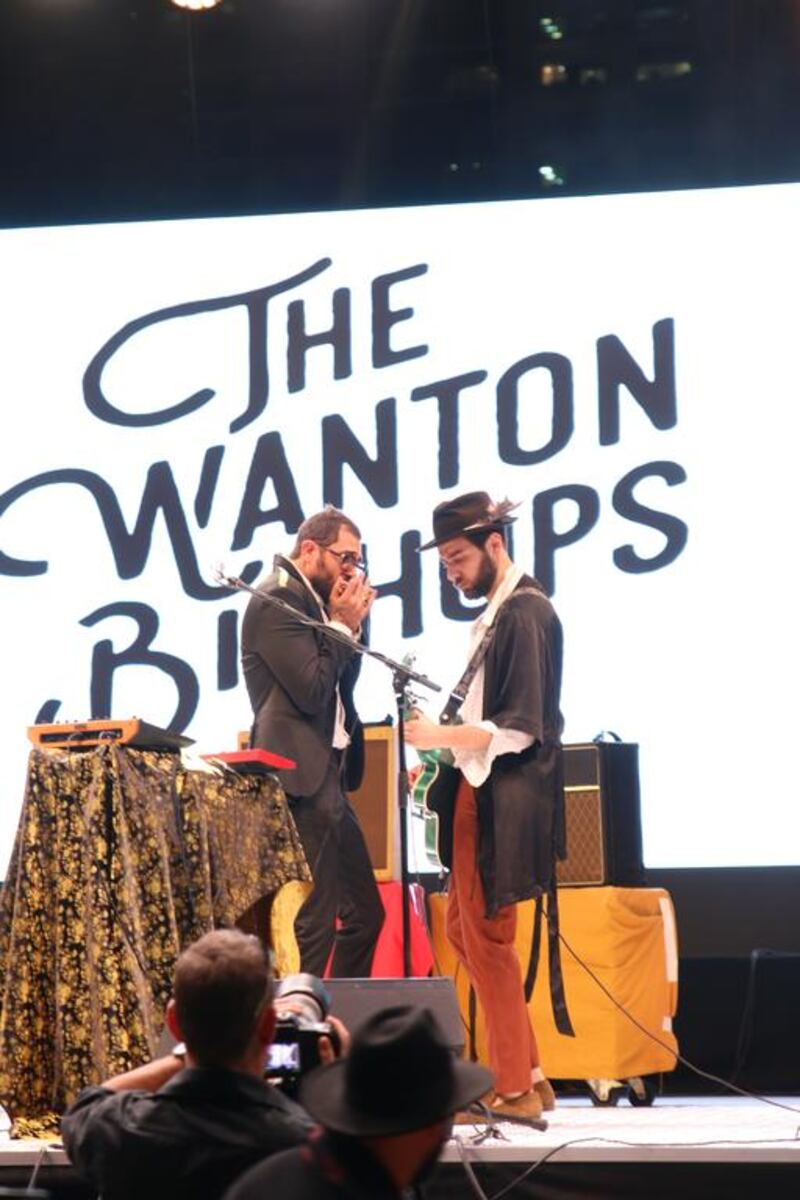A total of 20 Middle Eastern acts descended on Dubai this weekend (March 7) for the inaugural Step Music Festival. However before the sun set and the spotlights glared, musicians, promoters and industry types took to the stage to speak, not sing, as part of a programme of engaging talks, all hosted at Dubai International Marine Club.
Here’s five lessons we learnt about the region’s burgeoning alternative Arabic music scene.
Even Mashrou’ Leila aren’t (that) rich
Mashrou’ Leila might have enjoyed unparalleled success for a regional indie act, touring widely internationally and clocking some 440,000 Facebook fans, but lead singer Hamed Sinno claims even they still struggle to make ends meet – and rather than a Ferrari, he drives a 1998 Mitsubishi.
“In 2012 we quit our jobs, it wasn’t necessarily rational at the time, we just decided the only way to progress was to do that,” says the Lebanese frontman, of the band which was founded in 2008.
“And honestly it’s still not the most rational decision. We’re not living it large – we live on pizza.”
Later, Sinno launched a scathing attack on regional major labels for failing to invest in talent, saying his band enjoy more freedom and support from labels in Europe.
“There’s no money,” he added. “We can tip-toe around the subject as much as possible – but the thing which drives the music scene is money.”
Beware of big-fish-small-pond syndrome
Blues-influenced rockers The Wanton Bishops have enjoyed notable success across much of Europe, but frontman Nader Mansour offered a withering warning about bathing in small-time success in the relatively undeveloped Middle Eastern music scene.
“You’re rock stars in ten minutes,” says the singer of his hometown, Beirut. “It’s an advantage, you’re the best in your city immediately – it’s ridiculous.
“It’s painful in some way ways, but you’re immediately an export. Europe has a lot more [industry] infrastructure – but at the same time there’s ten other bands on the same street as you doing the same thing.”
Of the Bishops’s international notoriety, Mansour compared the inevitable exotica that Western listeners detect in a Lebanese act playing blues to the trauma of Stockholm syndrome.
“At first it’s enjoyable, then painful, you become a story – and just a story,” he added. “Get over it and start asking us about the music.”
Calling the scene “local” sounds patronising
Abbo Abbondandolo – the founder of thriving Dubai open mic series GoPlayTheWorld – says he has banned the word “local” from all posts and promotions, because it puts sceptical UAE audiences off.
“We’ve had events where people have asked ‘where did you fly [these musicians] from?,” he said. “The struggle is making people really believe we have talent here.”
The British singer-songwriter also hit back at the idea there is any rivalry between his concert platform and its two main contemporaries, Freshly Ground Sounds and The Sound Gaarden.
“Everyone in the world everywhere is competing,” he added. “But as much as people think we are [competing], we’re co-operating really well.”
Newsflash: Don’t trust the record company (wo)man
Among the biggest recent regional success stories is rap duo Flipperachi & Daffy's 2016 smash Ee Laa, which has attracted 14 million YouTube views and is the only GCC nominee at the upcoming first Arab Nation Music Awards.
But the producer behind the track, DJ Outlaw, told how no one gave a monkeys when he took it to the established channels.
“We approached record labels that didn’t think it was a single,” says the Bahraini producer. “They wanted to take if off the album – I said ‘no, I believe in this, I’m going to drop it independently anyway’.
“Labels don’t know anything.”
Brands – think outside the box (and hire Gaya, not Rihanna...)
Today, with conventional record sales almost non-existent and streaming income minimal, many upcoming regional acts rely primarily on lucrative sponsorships deals and brand partnerships.
Among the principle beneficiaries in the UAE is electro-pop duo Hollaphonic, whose Olly Wood called on more international brands to take a chance on regional names.
“Here [in the GCC] it’s a very small market – they don’t have to use Rihanna, they can use [Dubai singer-songwriter] Gaya,” said the British musician.
“There are options here that will resonate more on the ground – Rihanna won’t come here, but Gaya is here every single day.”





